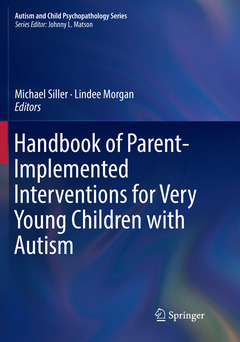Description
Handbook of Parent-Implemented Interventions for Very Young Children with Autism, Softcover reprint of the original 1st ed. 2018
Autism and Child Psychopathology Series
Coordinators: Siller Michael, Morgan Lindee
Language: English
Subjects for Handbook of Parent-Implemented Interventions for Very...:
Keywords
ASD performance-based feedback; Autism spectrum disorder and parents; Coaching for parent-implemented ASD treatments; Developmental intervention and autism; Early intervention for ASD; Emotion regulation in toddlers with autism; Extended families and ASD interventions; Family risk factors and autism; Family routines and toddlers with autism; Father involvement in ASD treatments; Group-based approaches to parent ASD education; Marital transitions and autism; Modeling for parent-implemented ASD treatments; Parent-mediated interventions and autism; Parental social networks and ASD interventions; Parenting cognitions and practices and autism; Poverty and autism; Rural communities and parent-implemented ASD interventions; Siblings and autism; Unemployment and autism
Publication date: 12-2018
Support: Print on demand
Publication date: 08-2018
Support: Print on demand
Description
/li>Contents
/li>Biography
/li>Comment
/li>
- Supporting families of high-risk infants who have an older sibling with ASD.
- The use of video feedback strategies in parent-mediated early ASD intervention.
- The Incredible Years (IY) Parent Program for preschool children with ASD and language delays.
- Self-help for parents of children with ASD.
- The Family Implemented TEACCH for Toddlers (FITT) support model.
- Parent-implemented interventions for underserved families in Taiwan.
- Family and provider-based interventions in South Asia.
Synthesizes research on involving parents as partners in interventions for very young children with autism spectrum disorder (ASD)
Explores individual differences in parental cognition, emotions, and practices and the effects on implementing interventions with toddlers
Offers strategies for supporting diverse families
Uses technology (e.g., video conferencing and online coaching) to engage families in rural communities?




